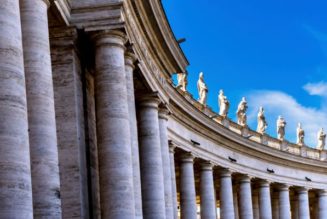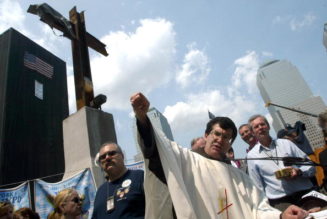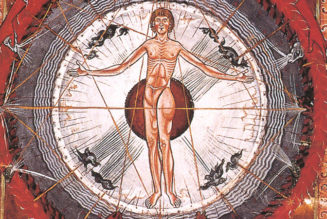
by Carrie Gress
A couple of years ago, my husband and I had dinner with a wonderful bishop at a trendy restaurant in Washington, D.C. It was the first time I recall actually sensing just how out of favor bishops are in an urban setting. Between then-Cardinal McCarrick in the news and the seeming triumph of the LGTB movement, my husband and I confided to each other afterward that it was the first time we could have imagined a restaurant doing something unsavory to our food because of our guest in black with a pectoral cross.
There was a time, not too long ago, when it was a big deal for a cardinal or bishop to appear on TV, bringing the moral authority of the Church into our living rooms, like Archbishop Fulton Sheen. Those days are now gone, even though internet streaming makes it possible for them to be almost ubiquitous. What is sad, ironically, is not the bishops’ missing presence, but their missing authority. Yes, they still have clout among many in their flocks — like a celebrity cousin in the family — but their teaching authority has lost much of its previous heft. While numerous bishops are holy and steadfast, some simply reflect the popular culture and its vices rather than champion the infallible teaching of Christ and his Magisterium.
The absence of leadership in some of our shepherds is a continual wound for many. “These are our shepherds! Why won’t they lead? What are they doing?” But this wound doesn’t have to continue to bleed. We have two things we can do.
The first thing we can do is change ourselves. Rather than being mired in anger and dismay, we can adjust our expectations. We can recognize that, perhaps, some of these men are simply incapable of leading well because of vice, sin, human weakness, cultural mores, and, yes, demonic influence. They are targeted precisely because they are heads of the Church, which doesn’t absolve sin, but it does explain that perhaps they have a larger heaping of demonic attacks than the rest of us.
Changing our expectations has a hidden benefit – it frees us emotionally from carrying the weight of scandal. It frees us to lift them up to Jesus, offering them back to him in expectation that he can–and will–do something. We are free from the anticipation of that magical moment when the weakest among them figure out how to be the shepherds we want.
The second thing we can and we must do is pray and sacrifice for these men. Ardently, fervently, consistently, and constantly. Not just a passing thought, but serious prayer and sacrifice. “But they don’t deserve it,” might be an objection. Exactly. None of us deserve Christ’s love and mercy.
Imagine how holy these men would be if we spent half the amount of time we raged against them or spoke poorly about them as we did praying for them. In our humanity, it is easy to feel like we are doing something efficacious by allowing ourselves to feel and voice our emotions, but with the eyes of faith we know that we are far more efficacious in prayer and sacrifice.
Imagine what could happen if every U.S. Catholic prayed and made a small sacrifice for these men? Truly, we will only know what will happen on the other side of eternity, but we have to try and trust that truly praying for these men, who are the head of the Church, will lead them to deeper grace. For those who are already wonderful leaders, may our prayers lead to protection and a louder voice, and for the prodigal, perhaps it can lead to the Father’s home and heart.
We also must be mindful of those who continue to rage against the bishops. Dr. Bob Schuchts, from the John Paul II Healing Center, speaks directly about those who maintain an unhealthy attachment with bishops. “My experience with those who are chronically angry and resentful toward those in authority (e.g. bishops) is that they are often reacting to echoes of deeper wounds within their own hearts regarding authority, and most often with fathers. I rarely find much movement until they are able to find healing (inner healing prayer and forgiveness) for childhood root issues, which allows compassion and healthy detachment and then intercession from a place of love. As long as the person remains in self-righteous judgement towards bishop and earlier authority figures, they remain in an unhealthy attachment. Healthy discernment (right judgement) is accompanied by compassion and a desire to intercede.”
Yes, weak men have done their best to destroy the Church since Judas. When Napoleon warned Pope Pius VII’s Secretary of State that he had the power to destroy the Church, Cardinal Ercole Consalvi responded with pluck, “Your majesty, we, the Catholic clergy, have done our best to destroy the Church for the last 1,800 years. We have not succeeded, and neither will you.” The Holy Spirit is in charge. There is no other explanation for the Church’s continued existence. But we can do our part to pray for healing, grace, clarity, and true leadership from all our shepherds.
***
At Theology of Home, we have always made an effort to truly live out our faith with the hope that our readers leave our site feeling edified, creative, informed, and ready to challenge the world. In light of that, as the Church enters a new year, we are taking our challenge to pray for our shepherds seriously and adding to each Daily Collection a specific bishop to lift in prayer and sacrifice.
Our Lady nurtures and cares for us with a womanly tenderness, but she also crushes the head of the serpent and fights militantly on behalf of eternal souls. What good mother can do otherwise? As women in the Church, we are called to follow her lead, like the female saints of every age, to fight like her, to fight like a saint, with compassion, mercy, humility, healing, intercession, prayer, affection, and love. Join us!
Join Our Telegram Group : Salvation & Prosperity









